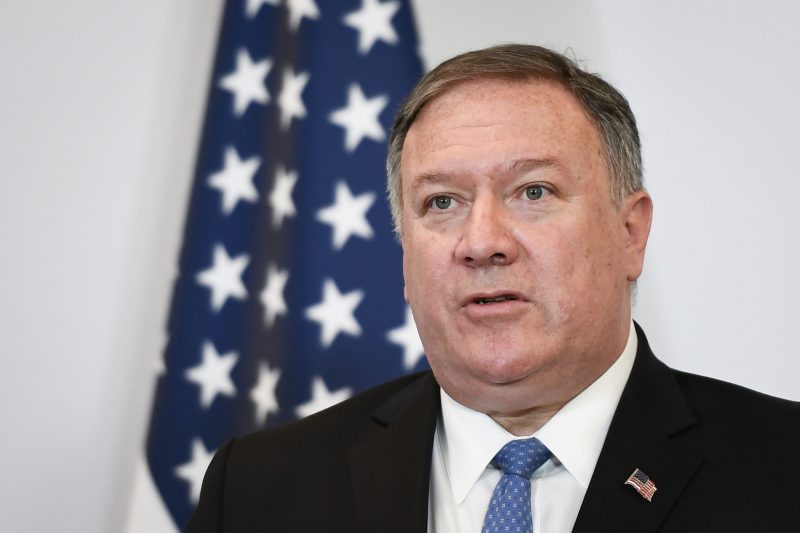Hopes dim further on US Middle East plan
US Secretary of State Mike Pompeo, in a leaked conversation, acknowledged doubts that a peace plan for the Middle East will succeed (Fabrice COFFRINI)
Washington (AFP) – Already low hopes for a US peace plan in the Middle East dimmed further Monday as President Donald Trump acknowledged widespread doubts and his son-in-law Jared Kushner suggested Palestinians weren’t ready to govern themselves.
The Trump administration, which has staunchly supported Israeli Prime Minister Benjamin Netanyahu, has seen a surprise bump in its rollout after the right-wing prime minister failed to form a coalition, triggering new elections.
The United States will lay out an economic component of the plan on June 25-26 in Bahrain but has said that the political plan will come out only “when the timing is right.”
Secretary of State Mike Pompeo, in a closed-door meeting last week with Jewish leaders that was leaked to The Washington Post, frankly acknowledged obstacles to the peace plan.
“It may be rejected. Could be in the end, folks will say, ‘It’s not particularly original, it doesn’t particularly work for me,’ that is, ‘It’s got two good things and nine bad things, I’m out,'” he said, according to the newspaper, which said it heard a recording.
Asked about his remarks in an interview with the Sinclair Broadcast Group, Pompeo again conceded that observers could look at Trump’s track record and perceive that the plan will be “fundamentally one-sided” toward Israel.
But, he said: “It is just simply not true.”
“I think there will be things in this plan that lots of people like,” he said.
Trump, asked about Pompeo’s doubts on the plan gaining traction, said: “He may be right.”
“I think we have a good chance, but we’ll see what happens,” he told reporters.
Trump, who has repeatedly sought to boost Netanyahu’s political prospects, said that Israel was “all messed up” and that it was “ridiculous” that the Jewish state is heading to its second election this year.
– Palestinians not ‘capable’ of governing? –
The Bahrain conference is expected to see pledges to boost the troubled Palestinian economy from Gulf Arabs — who, despite not recognizing Israel, have formed an indirect alliance due to shared hostility toward Iran.
In turn, the political plan is expected to avoid calling for the creation of a Palestinian state — the key goal of decades of sometimes intense US diplomacy.
Jared Kushner, Trump’s son-in-law and senior adviser who is spearheading the plan, in an interview with news site Axios said that the Palestinians “should have self-determination” but suggested they were not ready for a full state.
“The hope is, is that over time, they can become capable of governing,” Kushner, who has close family ties to Netanyahu, said when asked if he believes the Palestinians can govern themselves without Israeli interference.
Kushner said the Palestinians “need to have a fair judicial system … freedom of press, freedom of expression, tolerance for all religions” before the Palestinian territories can become “investable.”
The Palestinians have rejected US mediation and are boycotting the Bahrain conference, saying Trump is not an honest broker.
Trump, whose evangelical Christian base strongly backs Israel, has broken precedent by recognizing both Jerusalem as Israel’s capital and the Jewish state’s sovereignty over the Golan Heights, captured from Syria in the 1967 Six-Day War.
– Economic plan less controversial –
David Makovsky, director of the Project on Arab-Israel Relations at the Washington Institute for Near East Policy, said the Trump administration likely would have presented the economic and political plans together if it were more confident of success.
“The decision of the administration to split them into two, which hasn’t gotten as much attention, is very telling. It says that the economics are less controversial and there is more skepticism about resolving these core issues that often seem zero-sum — if one side has it, the other does not,” he said.
“In a strange tactical sense, the Israeli election is actually good news for the administration because it gives them a public rationale when talking to the media to say, well, we can’t do it now because there is a new Israeli election,” he said.
But he questioned how much Arab donors would commit without prospects for a peace deal on the core political issues.
And he said the Israeli vote presented another potential sticking point — by the time a government is formed, it could be October or November, when the United States itself will be heading into election season.
Disclaimer: Validity of the above story is for 7 Days from original date of publishing. Source: AFP.


